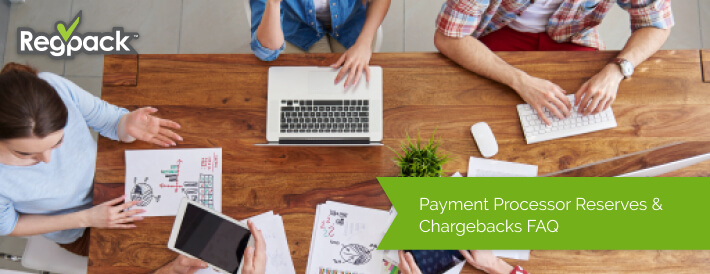A reserve is a common practice in the payment world. Financial institutions, including payment processors, utilize a reserve to cover chargebacks that may come in to your merchant account from your customers.
What is a chargeback?
A chargeback is a customer request to the financial institution disputing the charge from you, the business owner.
If a customer believes they were charged incorrectly, they can dispute the charge on their credit card or with their bank.
The process for a chargeback is a consumer right, and isn’t something you can prevent from happening. While this option is part of consumer protection, it can be frustrating for businesses.
As a business, you have the option to contest all chargebacks directly with your payment processor, and every payment processor has a procedure to follow to do so.
What is a reserve and what does it cover?
Reserves help protect both the business and the payment processor from chargeback related costs.
Payment processors have a risk team that assess whether or not an organization should be required to have a reserve. Often times this risk is based on your industry and whether or not your industry has a low or high chargeback trend.
Most businesses are NOT required to hold a reserve. Risk is always reassessed based on changes to the economy, making some businesses more risky or less risky depending on the economic conditions.
For example, COVID-19 has increased the risk for some industries that are traditionally low risk. Travel companies, marijuana based business, and adult entertainment industries are generally always in a riskier category and are used to processors requiring a reserve.
Will I get the money reserved by my payment processor back?
It’s important to note that the reserve amount, if your payment processor asks you to maintain one, is ALWAYS your money.
Many payment processors require either a set amount or percentage of your average sales to hold as a reserve. If you were to close your account or the risk team re-assesses your reserve ratio, that money would come to you.
The reserves sole purpose is to ensure your account does not go into the negative and can cover potential chargebacks.
Do I have options when it comes to a payment processor requiring a reserve?
Yes and no. Depending on your risk assessment, some payment processors might deny your merchant application immediately due to the nature of your business.
Reserves allow processors to serve riskier industries, without having to deny them completely from access to a payment processing merchant.
Risk teams at most financial institutions work similarly, so you’ll be hard pressed to find a processor that would not require you to have a reserve if another processor did require you. You are however free to shop around to find the best rates and reserve policy for your business.
How can I lower my chargeback risk and successfully dispute chargebacks?
At Regpack, we recommend all of our clients have a detailed cancellation and refund policy. Using our e-signature tool, you can get a legally binding signature on your terms and conditions. Often this is all you need to successfully dispute a chargeback.
We also recommend services like Purchase Protection, which not only gives your clients an option to be reimbursed for missed or cancelled events without you footing the bill, but is another layer of chargeback protection for your business.
We also recommend making sure your soft description, or what the buyer will see on their statement, is clear. The software you are using for payment processing should allow you to customize the soft descriptor.
For example, Regpack’s soft description is “Regpack”. So when we charge clients are their monthly or annual admin fee, the business immediately understands this charge is from us, and therefore not dispute it because they recognize the company name and the charge makes sense.
